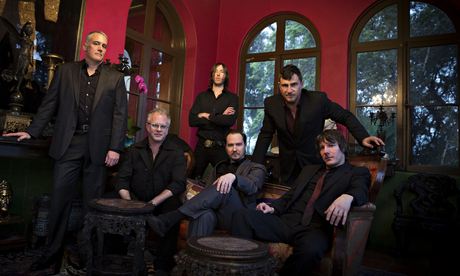
An odd thing happened at SXSW last year. Usher – that's the multimillion-selling soul'n'B star Usher – shared a stage with the Afghan Whigs, a criminally under-appreciated 90s rock outfit who had reunited a year previously. They did Whigs songs and Usher songs, without the engineered camaraderie these collaborations usually entail. The Whigs might have initially signed to Sub Pop during the grunge era (later going major), but they were always a sophisticated proposition; no holes in their jeans, handy with the cover versions. They were – and continue to be – red-blooded men's men with a muscular grasp of soul music, a full lifetime before indie music "discovered" R&B in earnest; emphasisers of the "sin" in their native Cincinnati. Check Gentlemen (1993), Black Love (1996) and 1965 (1998) for details.
Behind Usher, they became a gnarlier version of the Roots, with ease. As singer Greg Dulli tells it, something in that assured performance sparked the desire to record anew, despite the absence of original guitarist Rick McCollum, whose personal issues prevent a full house. (A small army of guest guitarists fills in on the new album.) Dulli, meanwhile, had spent the intervening decade and a half managing bars and recording as the Twilight Singers (and, alongside Mark Lanegan, as the Gutter Twins) – still darkly productive, but without the grandiose reach of the Whigs. The oddness of a Whigs gig with Usher was trumped only by the tweeted announcement of the first AW record in 16 years – by Breaking Bad actor Bob Odenkirk.
Passions still run high. The first riff of Parked Outside announces their intentions: low-slung and unforgiving. Dulli is not parked outside in an accommodating, let-me-take-you-out way: he's stalking you, and singing in a lusty man-wail that immediately justifies this entire high-above-par reunion record. The Lottery shimmies and skulks in equal measure, waiting for the respite of the dawn. Dulli's voice is shot here, whether by design or default is hard to tell. But he seethes persuasively: "The lottery/ The ritual/ The consequence/ The criminal/ Come back to me/ I've been them all…"
Very little on Do to the Beast sounds anything like Usher material, then. But the Whigs' highly developed sense of slink comes in regular flashes, as booty-shaking as ever. Matamoros is a particularly swinging cut that would work as well as a digital R&B beat as it does on guitars. It finds the 40-something Dulli (a kind of midwestern Nick Cave weaned on rhythm'n'blues rather than murder ballads) whispering, in falsetto, a mixture of threat and seduction – intentions that have overlapped enthusiastically in the Whigs' past works. It's no surprise to learn that Matamoros is a Mexican town infamous for satanic murders. I Am Fire has the kind of tricksy rhythms that could act as an R&B click-track, compromised somewhat by excessive calm on the verses.
So it's not perfect. Dulli's throat is not quite what it was when he sang "I'm not the man my actions would suggest" on 1993's Debonair (but the jury is out on whether he's affecting strain or really straining). The outro, These Sticks, is a ballad whose chord progressions and textures wander far too close to Radiohead. Stick around, though, and the Whigs' stately menace wins out over the peculiar parallels. "You thought me easy, you thought me prey," Dulli croons, as a sax exhales in the distance, "I've come to meet you, I've come to make you pay."

